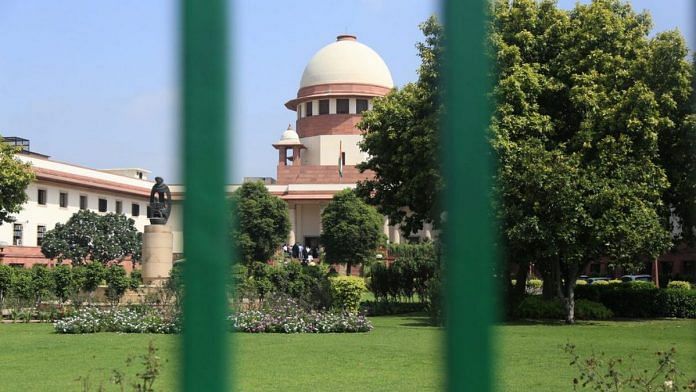New Delhi: On 11 January 2021, the Odisha government moved the Supreme Court against a 2015 high court order — 1,954 days (over 5 years) after the limitation period of 90 days to file an appeal ended.
Last year, the central government approached the top court against a Delhi HC order delivered in December 2018 in a case related to parity in pay scale of school employees 532 days after the limitation period.
These are among at least 40 cases in which a Supreme Court bench, for a year now, has been pulling up the Centre and some states for filing appeals much beyond the stipulated time period.
The bench, headed by Justice Sanjay Kishan Kaul, has since January 2020 imposed fines while deprecating the authorities concerned for approaching the top court belatedly and “having wasted judicial time” as if “the statute of limitation does not exist for them”.
In the Odisha case, the bench dismissed the petition as time-barred and directed the state to deposit Rs 25,000 as fine with the Supreme Court Advocates on Record Welfare Fund.
In the second case involving the central government, the SC bench imposed a fine of Rs 1 lakh on 4 February 2021.
The ‘law of limitation’ sets a time period within which appeals against high court orders should be filed before the apex court.
Under the Limitation Act, an appeal before the Supreme Court should be filed within 90 days of a high court order. Delay can be condoned if the applicant satisfies the court that there were sufficient reasons for not preferring an appeal within the statutory period.
In the 40 cases, the top court mostly noticed a delay of 400 to 600 days, and imposed fines ranging between Rs 10,000 and Rs 1 lakh as petitioners failed to assign cogent reasons to explain the delay and refused to pay heed to court’s repeated warnings against “such endeavours”.
More than 90 per cent of the 40 cases were dismissed with fines, and notices were issued in only 10 per cent of them, albeit with heavy fines, according to SC orders in all the cases, accessed by ThePrint.
In all these matters, the bench noted, the delays reflect “a saga of movement of file from one department to other with no cogent explanation why for months together files have been detained in the department”.
The court has also coined a term to describe such matters as “certificate cases”, which, it noted, are filed “for formality” with an objective to “obtain a certificate of dismissal from the Supreme Court to put a quietus to the issue”, according to the orders.
“We have been repeatedly discouraging such endeavours where the governments seem to think that they can walk in to the Supreme Court any time they feel without any reference to the period of limitation, as if the statutory Law of Limitation does not exist for them,” the bench said in several orders issued, reiterating that governments have to follow the law till it exists.
The Supreme Court, on many occasions, also said the court is not there to “protect the administrative inefficiencies and incompetence in being able to avail of legal remedies by state governments”.
Also read: 10 reasons why the Supreme Court is looking like a court of ‘trivial pursuits’
‘Officers should bear consequences’
Observing that belated appeals are filed by negligent officers to save their skin, which end up wasting judicial time, the court gave liberty to states to recover the fine from such government officials.
“The petitioners (states) should recover the costs from the officers responsible for the delay and if by the impugned judgment any loss has been caused to the petitioners, it is always open to them to recover that also from the officers concerned,” the bench ordered.
Non-compliance of the orders will be treated as contempt, the court warned in the cases.
Also read: Suspicion, however strong, cannot take the place of proof — Supreme Court
‘Technology available to assist govt’
In almost all cases, the reasons given by different states for approaching the top court beyond the limitation period were identical.
Some of the excuses given by states for the “unintentional delay” were “unavailability of the documents”, “time-consuming process of arranging the documents”, “bureaucratic process” and “administrative procedures”. They relied upon a 1987 Supreme Court judgment, seeking to condone the delay.
However, rejecting the same, the court said the judgment was given at a time when technology was not available for assistance of the government, a factum which is not present today.
“The purpose of coming to this court is not to obtain a certificate,” the court said, disapproving even the government lawyers’ approach in the matters.
It was noted by the bench that advocates in the cases presumed that the court will condone the delay and straightaway address the merits of the case, without referring to the aspect of delay or acknowledging it.
The bench rejected the “preposterous proposition” or “excuse” propounded by states that if there is some merit in the case then the period of delay is to be given a go-by.
The court also noted inefficiency or a deliberate endeavour, which could be the two reasons for the various government machineries to act belatedly.
It cited a 2012 judgment — Chief Post Master General v/s Living Media Limited — to hold that delay in filing of appeals cannot be condoned and in view of the technological advancement no leeway can be given for government inefficiency. The bench referred to this judgment in almost all the 40 cases, the SC orders showed.
“We have raised the issue that if the government machinery is so inefficient and incapable of filing appeals/petitions in time, the solution may lie in requesting the legislature to expand the time period for filing limitation for government authorities because of their gross incompetence,” the bench has said.
Also read: Modi govt took nearly a year to clear 24 names for HC judge appointments in 4 states



